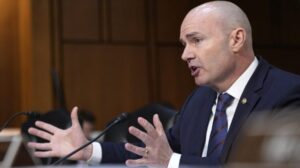Congress
Capitol agenda: Thune’s biggest megabill fires
Senate Majority Leader John Thune has some “big, beautiful” conflicts to resolve — and fast — if he wants to pass his party’s tax-and-spending package next week as planned.
Here’s a look at the biggest fires Thune needs to put out to meet his deadline, some of which are newly raging following Senate Finance’s release of long-awaited bill text:
MEDICAID JITTERS — “Medicaid moderates” are reeling after Republicans on the key committee proposed lowering the provider tax,from 6 percent to 3.5 percent by 2031 for states that have expanded Medicaid offerings under the Affordable Care Act. Several states rely heavily on this tax to help fund their Medicaid programs.
Republicans, including Sen. Josh Hawley (Mo.), were already rebelling against the House-passed megabill’s move to find savings by freezing the provider tax. Now, Hawley is saying he’s “alarmed” that Senate Finance would go even further and that the plan “needs work.”
“I don’t know why we would defund rural hospitals in order to pay for Chinese solar panels,” he told reporters Monday evening, in a nod to Senate Republicans’ plan to ease some of the House GOP’s deep cuts to clean-energy tax credits (more on that below).
Sen. Susan Collins (R-Maine) also expressed concern about the provider-tax change, though she declined to elaborate as she left the closed-door meeting Monday night where Finance Chair Mike Crapo (R-Idaho) was briefing GOP senators on his proposal. But Sen. Rick Scott (R-Fla.) said he doesn’t think the plan would go far enough in slashing spending on the safety-net program, suggesting senators should reconsider including a provision that would scale back the federal government’s share of paying for states’ Medicaid expansion.
Expect this to be a topic of discussion when GOP senators meet with CMS Administrator Mehmet Oz Tuesday during the conference’s weekly lunch.
HOLD THE SALT — Blue-state House Republicans are seething as senators continue to haggle down their state-and-local-tax deduction cap. GOP senators included the current $10,000 deduction limit — rather than the $40,000 the House passed — as a placeholder in the draft bill text Senate Finance released Monday, giving space for talks to continue.
Rep. Mike Lawler (R-N.Y.) declared the Senate’s proposal “dead on arrival” in the House. But Sen. Markwayne Mullin (R-Okla.), who’s been backchanneling with SALT Republicans including Lawler, insisted to reporters that the deduction is “fully open for negotiating.” Thune also told reporters Monday that senators are “prepared to have discussions” amongst themselves to “figure out a landing spot.”
LESS GUTTING FOR GREEN CREDITS — Senate Republicans are extending some of the House’s aggressive phase-out dates for credits benefitting “baseload” energy technologies like nuclear, geothermal and hydropower, leaving one GOP proponent of the incentives, Sen. Thom Tillis (R-N.C.), “generally satisfied.” They are still making significant cuts to solar, wind and electric vehicle incentives in Democrats’ 2022 climate law, but that’s not going to satisfy conservatives who want a full repeal of what they call the “Green New Scam.”
House Freedom Caucus members, who pushed for deep cuts to the green credits in order to get behind the megabill in their chamber last month, could fight the Senate’s slower roll. One member, Rep. Chip Roy (R-Texas), declared on X he “will not vote for this.”
Dive deeper into the long list of other Senate Finance megabill changes.
What else we’re watching:
— Lawmaker safety after Minnesota shootings: Senators have a classified security briefing with the chamber’s sergeant at arms and Capitol Police this morning, where the question of resources for lawmaker safety could come up. Across the Capitol, House Minority Leader Hakeem Jeffries is asking Speaker Mike Johnson to increase funding for members’ security as more elected officials learn they were potential targets of the man suspected of the shootings in Minnesota.
— Senate’s first major crypto overhaul: The Senate is set this afternoon to pass landmark cryptocurrency legislation, one of Trump’s biggest policy priorities outside the megabill. The bipartisan bill would create a regulatory framework for digital tokens known as stablecoins that are pegged to the value of the dollar. But the legislation faces a murky future in the House.
— Gabbard, Ratcliffe on Blue Light News: Director of National Intelligence Tulsi Gabbard, CIA Director John Ratcliffe and NSA acting Director Lt. Gen. William Hartman will testify on behalf of the president’s fiscal 2026 budget request for intelligence during a closed Appropriations subcommittee hearing.
Jordain Carney, Brian Faler and Jasper Goodman contributed to this report.
Congress
‘Kill shot’: GOP megabill targets solar, wind projects with new tax
Senate Republicans stepped up their attacks on U.S. solar and wind energy projects by quietly adding a provision to their megabill that would penalize future developments with a new tax.
That new tax measure was tucked into the more than 900-page document released late Friday that also would sharply cut the tax credits in the Inflation Reduction Act for solar and wind projects. Those cuts to the IRA credits were added after a late-stage push by President Donald Trump to crack down further on the incentives by requiring generation projects be placed in service by the end of 2027 to qualify.
The new excise tax is another blow to the fastest-growing sources of power production in the United States, and would be a massive setback to the wind and solar energy industries since it would apply even to projects not receiving any credits.
“It’s a kill shot. This new excise tax on wind and solar is designed to fully kill the industry,” said Adrian Deveny, founder and president of policy advisory firm Climate Vision, who helped craft the climate law as a former policy director for Democratic Senate Leader Chuck Schumer.
Analysts at the Rhodium Group said in an email the new tax would push up the costs of wind and solar projects by 10 to 20 percent — on top of the cost increases from losing the credits.
“Combined with the likely onerous administrative reporting burden this provision puts in place, these cost increases will lead to even lower wind and solar installations. The impacts of this tax would also flow through to consumers in the form of higher electricity rates,” Rhodium said.
The provision as written appears to add an additional tax for any wind and solar project placed into service after 2027 — when its eligibility for the investment and production tax credits ends — if a certain percentage of the value of the project’s components are sourced from prohibited foreign entities, like China. It would apply to all projects that began construction after June 16 of this year.
The language would require wind and solar projects, even those not receiving credits, to navigate complex and potentially unworkable requirements that prohibit sourcing from foreign entities of concern — a move designed to promote domestic production and crack down on Chinese materials.
In keeping with GOP support for the fossil fuel industry, the updated bill creates a new production tax credit for metallurgical coal, which is used in steelmaking.
Congress
Elon Musk renews megabill attacks
Elon Musk is once again bashing the Republican megabill.
Weeks after an initial tirade against the legislation, the former top White House staffer and current richest man in the world wrote Saturday on X that the “latest Senate draft bill will destroy millions of jobs in America and cause immense strategic harm to our country!”
“Utterly insane and destructive,” he added. “It gives handouts to industries of the past while severely damaging industries of the future.”
The bill significantly cuts subsidies for clean power sources like wind and solar, along with tax credits for buying electric vehicles and instead includes incentives for the coal industry.
Musk has intervened before to tank a major spending bill. The billionaire torpedoed a compromise government spending bill in December by repeatedly posting in opposition to it. This caused a number of Republicans to back away and nearly spaked a government shutdown.
At the time, Musk had far more influence as a close Trump ally and as the largest donor in support of Trump’s re-election bid. His influence in the GOP has waned after his controversial stint atop the Department of Government Efficiency initiative created repeated hassles for the White House.
Congress
House could vote on megabill as soon as Tuesday
House Majority Leader Steve Scalise told GOP members on a Saturday conference call to prepare for votes Tuesday evening or Wednesday on the sweeping Republican megabill, according to three people who were on the call and were granted anonymity to describe it.
Scalise and Speaker Mike Johnson addressed House Republicans as GOP leaders in the Senate raced to tweak and advance their version of the megabill. Johnson said on the call he has been working with Senate Republican leaders to shape the bill so the version that emerges from the other chamber can be passed in the House without changes and sent to President Donald Trump for enactment.
The leaders have been planning to iron out some issues in a final amendment before Senate passage, but Senate GOP leaders have pushed back hard on reversing deep Medicaid cuts — something dozens of House Republicans are concerned about.
Johnson also members to bring any remaining concerns directly to their GOP senators and to the White House — and to not air those grievances in public. House GOP leadership said they would stick with a promise to give members 48 hours notice of a vote so that lawmakers have adequate time to return to Washington.
House GOP leaders did not take questions on the call.
-

 The Josh Fourrier Show8 months ago
The Josh Fourrier Show8 months agoDOOMSDAY: Trump won, now what?
-
Uncategorized8 months ago
Bob Good to step down as Freedom Caucus chair this week
-

 Politics8 months ago
Politics8 months agoWhat 7 political experts will be watching at Tuesday’s debate
-

 Politics8 months ago
Politics8 months agoHow Republicans could foil Harris’ Supreme Court plans if she’s elected
-
Economy8 months ago
Fed moves to protect weakening job market with bold rate cut
-
Economy8 months ago
It’s still the economy: What TV ads tell us about each campaign’s closing message
-

 Politics8 months ago
Politics8 months agoRFK Jr.’s bid to take himself off swing state ballots may scramble mail-in voting
-
Uncategorized8 months ago
Johnson plans to bring House GOP short-term spending measure to House floor Wednesday








